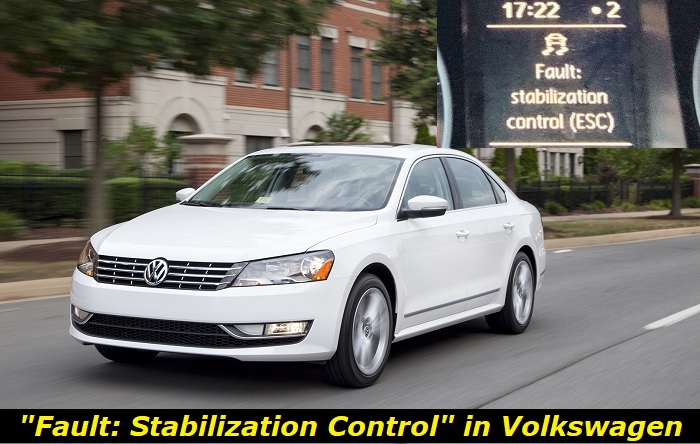Electronic Stability Control (ESC) is a nice piece of technology present in many cars, and one of its best applications can be found in the vehicles produced by Volkswagen. It ensures the stability of your ride to bring the best driving dynamics out of your auto while ensuring the comfort and safety of all its occupants.
Fault stabilization control message highlights
- Common reasons:one of the stabilization system components is bad, battery is low
- How to fix:check the battery, read the codes
- Possible consequences:no stabilization feature when driving
- Priority level:High
- Can you drive?Carefully
- DIY repair:Impossible
- Repair price range:$200-$750

How Electronic Stability Control Works
The ESC feature in Volkswagen cars is an advanced system that helps the driver stay in control of the vehicle during hazardous driving conditions. It works by detecting when a car has started to skid or spin out of control and then automatically applies brakes to individual wheels to stop it from sliding or spinning further. This helps the driver regain control of the car, maintaining safety and stability.
The ESC system uses four main components: sensors, ECU (electronic control unit), brake actuators, and ABS (anti-lock braking system). The sensors detect any changes in direction or speed while the ECU processes this information and calculates precise brake pressure. The brake actuators then send signals to each wheel telling them how much brake pressure to apply. As a result, the driver can regain control of the car in difficult situations.
The ESC system is different from ABS because it not only helps reduce skidding on slippery surfaces, but also helps prevent out-of-control spinning, particularly when a vehicle is cornering too quickly or on uneven terrain. The ABS helps improve braking performance by preventing wheel lockup; whereas the ESC ensures that a car responds accurately and predictably to steering inputs.
Most Common Causes of the Fault in the Stabilization Control of Volkswagen
A lot of things can go wrong with your vehicle that may result in a warning on your dashboard. When it comes to the ESC, these can range from electronic to mechanical issues, and they can be as simple as a minor bug in the system or damaged parts. This part will run you over the most common culprits as well as ways for you to address them:
1. Glitch in the System
Oftentimes, warnings in the dashboard may only be due to your vehicle's electrical system not cooperating in the grand scheme of things. As with any equipment aided by a computer, various bugs in the system can trigger false alarms including ones related to the ESC.
If you're lucky enough, the warning light may be gone as soon as you restart your car. In more ways than one, the light may still be in your dash upon starting your auto, but it might soon deactivate after driving it a few blocks around the neighborhood when the sensors and algorithms in the system finally decide to settle down.
The latter is regularly the initial solution advised by Volkswagen to customers experiencing the problem. However, if the errors persist, reflashing the Engine Control Unit (ECU) may hold the key to updating the system of your ride and patching up any bugs that may be present in it.
2. Malfunctioning Sensor
When the ESC error warning light is activated in a Volkswagen car, it often indicates a sensor malfunction. While this can be a bit tricky to diagnose and repair at times, there are some steps that can be taken to help identify the source of the problem.
Visual inspection is one of the first steps to take when diagnosing a sensor malfunction that may have triggered the ESC errors. Carefully inspecting underneath the hood and around various components for signs of corrosion or damage due to wear and tear is essential. It may also be necessary to look at any wiring or connections associated with sensors throughout the vehicle. If any wires or connectors appear frayed or otherwise damaged, they should be replaced as soon as possible.
The next step is to use a multimeter to further assess the situation. This tool can help detect issues related to voltage and current flow throughout the system. A technician should take readings from each of the sensors, testing both their resistance and continuity. If any readings are out of the expected range, it could be indicative of a malfunctioning component or connection that needs to be remedied for the ESC error warning light to turn off.
Finally, once any faulty components have been identified and replaced, it's important to test all systems again using a multimeter in order to ensure everything is working correctly before putting the car back into service. Doing this will reduce the likelihood of future issues arising due to sensor problems causing ESC errors in Volkswagen cars.
If you discover that the sensor malfunction is too complex to fix yourself, it's best to take your car to a certified technician for diagnosis and repair. They have the experience and expertise needed to correctly identify and solve this type of issue.
3. ABS Problems
Diagnosing the ABS-related causes of an ESC error warning light in a Volkswagen car requires careful attention to detail. Start with a visual inspection and test drive of the vehicle to identify any issues that may be at play. Look for signs of potential brake system wear, including leaking fluid or worn brake pads. Additionally, pay attention to whether the vehicle's brakes seem to be engaging normally during testing.
If visual inspection is inconclusive, it is recommended to use an OBD scanner to check for any diagnostic codes stored by the vehicle's computer system related to ABS braking system errors. These codes can provide further insight into what may be causing the ESC error warning light activation.
Lastly, if no discernible cause reveals itself from the OBD scan, it may be necessary to check the ABS wheel sensors and wiring. This requires a more in-depth inspection of the wheel speed sensors, checking for damage or corrosion that could lead to miscommunications between the sensor and control module. The same should also be done for any wiring running from the wheel speed sensor to ensure proper electrical connection.
If after all these steps are completed, there is still no explanation as to why the ESC error warning light is coming on, then it may be time to consult with a qualified technician who can further inspect and diagnose the issue. With their expertise, they will have a better chance of finding the root cause behind this problem. It is important not only to identify what is causing the issue but also to find a proper solution that will not just reset the light, but resolve the underlying issue.
4. Wheel and/or Tire Problems
Diagnosing the causes of wheel and/or tire problems that may be activating the ESC warning light in a Volkswagen car is an essential step to addressing this issue. A thorough inspection of the tires, wheels, and suspension components should be conducted accordingly to identify any of the culprits.
Tire pressure should be checked first as an unequal distribution of pressure can lead to misalignment and therefore activate the ESC warning light. It is also important to check for wear on each tire, including uneven tread wear or cuts or bulges in the sidewall. Any damage could significantly affect handling and activate the alert. The condition of the wheels should also be inspected. Pay attention to the presence of bent rims can lead to misalignment as well as rust or corrosion on the wheels.
Inspecting the suspension components is also important as worn shocks and struts may not be able to handle corners effectively and therefore trigger the ESC error warning light. Worn bushings can also cause similar problems, and worn tie rods could lead to misalignment. Finally, all relevant components should be checked for any looseness or play that could lead to misalignment and activate the fault in your dash.
By conducting a thorough inspection of tire pressure, tires themselves, wheels, and suspension components, you will be able to identify any issues that could be causing the ESC error warning light in your Volkswagen car and take appropriate action to address them through repairs or parts replacement.
Conclusion
The Electronic Stability Control (ESC) feature in Volkswagen cars provides an extra layer of safety for drivers and passengers alike by helping them stay in control during hazardous driving conditions. It is an advanced system that uses several components to ensure that the car responds accurately and predictably to steering inputs. This helps prevent out-of-control spinning which can result in serious accidents.
With that in mind, any warnings related to it must be handled in a timely manner whether it is only a simple glitch in the system or an aftereffect of damaged electrical and/or mechanical components.
About the authors
The CarAraC research team is composed of seasoned auto mechanics and automotive industry professionals, including individuals with advanced degrees and certifications in their field. Our team members boast prestigious credentials, reflecting their extensive knowledge and skills. These qualifications include: IMI: Institute of the Motor Industry, ASE-Certified Master Automobile Technicians; Coventry University, Graduate of MA in Automotive Journalism; Politecnico di Torino, Italy, MS Automotive Engineering; Ss. Cyril and Methodius University in Skopje, Mechanical University in Skopje; TOC Automotive College; DHA Suffa University, Department of Mechanical Engineering






Add comment